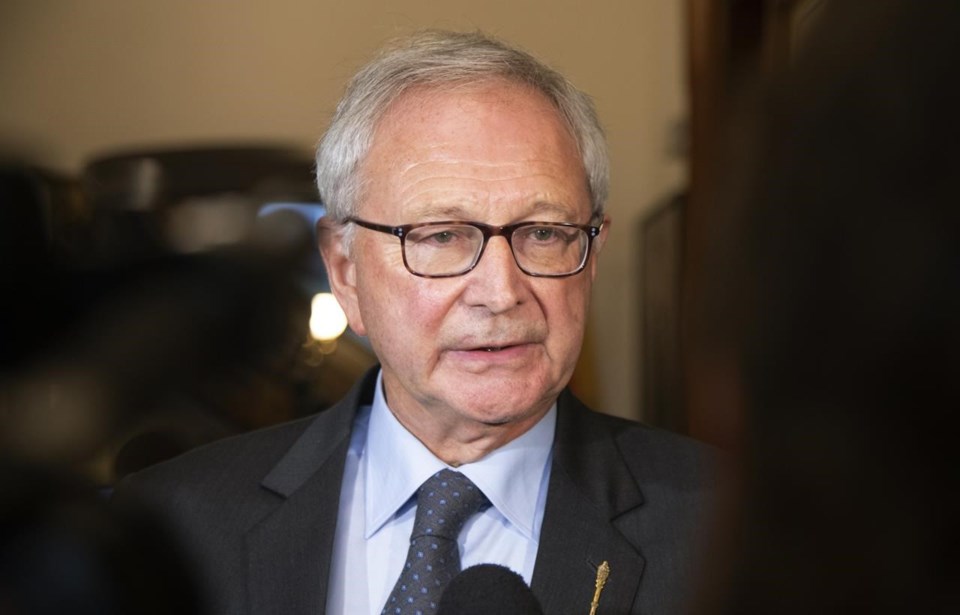FREDERICTON — New Brunswick's elections agency says it doesn't know exactly how much it spent while Premier Blaine Higgs pondered whether to call voters to the polls a year early, but opposition parties claim he cost taxpayers money.
For months Higgs waffled on calling an early election, repeatedly saying since June he needed a new mandate to quell the political drama that had gripped his party. Some members of his caucus, including two cabinet ministers, blamed controversial government decisions and the premier's leadership style for the turmoil.
And while it waited for the premier to make up his mind, the elections agency directed its returning officers to rent space for offices and polling stations, purchase equipment and hire and train officials.
Paul Harpelle, spokesman for Elections New Brunswick, said equipment purchases and the printing of voting materials are fixed costs that would be incurred regardless of when the province goes to the polls.
But other costs since Higgs started threatening to call an early vote, such as rental fees and salaries of returning officers and warehouse staff, may need to be incurred again — when the premier finally decides to launch an election campaign, Harpelle said in an email.
"Invoices for the various rentals, purchases and salaries that have been incurred to date are still coming in," he said. "Therefore, we are unable to provide you with a total figure at this time, nor can an assessment be made as to which expenditures are solely attributable to preparations based on election uncertainty until after the election is held."
Higgs confirmed Friday he won't call an election in 2023, ending weeks of speculation. The province's fixed election date said the government has until Oct. 21, 2024, to call a vote.
The premier said last week the recent political turmoil hasn't been good for the province or his majority government.
Two of the premier's cabinet ministers quit in June, citing his inflexible leadership style and changes the government made to the province's policy on gender identity in schools. Six Tory members of the legislature voted with the Opposition to call for an external review of the policy change, and Higgs responded by dropping dissenters from cabinet.
Under the changes to Policy 713, students under 16 who are exploring their gender identity must get their parents' consent before teachers can use their preferred first names or pronouns at school — a reversal of the previous practice.
The Tory government survived a non-confidence vote in the last week of October, and Higgs hinted that the province should be ready for an election at any time. However, he drew attention to the fact that the six Tory rebels voted against the Opposition Liberals' non-confidence amendment to the government's recent throne speech.
Mario Levesque, associate professor at Mount Allison University's politics and international relations department, said he feels bad for Elections New Brunswick, which has to be ready for an election at any time.
"We have a premier in New Brunswick right now who's basically playing Russian roulette in terms of ‘will I call an election, won't I call,’ and that's costing us taxpayers money," he said.
"The real culprit here is our premier, Blaine Higgs. He needs to stop playing around with people and stop recklessly spending our money. He likes to play cat and mouse with the public and stuff.”
He said he would “hate to hazard a guess” on the amount — the 2020 election cost the province about $11.6 million, so the initial costs this year would be a “fair bit."
The premier's office did not respond to a request for comment.
Green Leader David Coon said the election rumours and speculation reflected how self-absorbed Higgs has become with his own agenda.
"All the speculation and false starts for snap elections clearly didn't serve the common good of the province," he said. "It just ended up costing us money."
What's hard to calculate, Coon said, is how much work had been slowed down in the civil service since June.
"There was a lot of work put on hold because of the possibility of an imminent snap election," he said.
Liberal Leader Susan Holt echoed Coon, adding she didn't think the money spent on election speculation was "justifiable."
“Work wasn't happening on the things that New Brunswickers care about — improvements to our health-care system, our education system, advancement of municipal reform interests, development of housing strategies (and) development of homelessness strategies.”
Holt said her party is seeking documentation related to the costs incurred by the elections agency.
New Brunswick's fixed election date, she said, supports efficient and cost-effective planning.
But Levesque said fixed election dates are an American import and don't work in Canada.
"A majority government has up to a five-year term to govern," he said. "And yes, it does give the premier a little bit of leeway as to when they want to call an election so they can time it better — if the polls look better for them, or if the economy's doing better ... But that's part of politics, though, and that fits in with our system."
This report by The Canadian Press was first published Nov. 7, 2023.
Hina Alam, The Canadian Press



